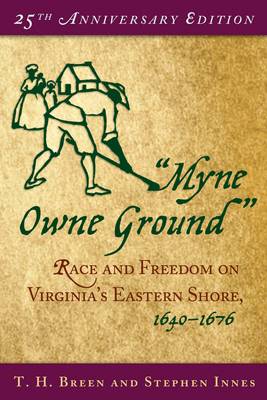
Bedankt voor het vertrouwen het afgelopen jaar! Om jou te bedanken bieden we GRATIS verzending (in België) aan op alles gedurende de hele maand januari.
- Afhalen na 1 uur in een winkel met voorraad
- In januari gratis thuislevering in België
- Ruim aanbod met 7 miljoen producten
Bedankt voor het vertrouwen het afgelopen jaar! Om jou te bedanken bieden we GRATIS verzending (in België) aan op alles gedurende de hele maand januari.
- Afhalen na 1 uur in een winkel met voorraad
- In januari gratis thuislevering in België
- Ruim aanbod met 7 miljoen producten
Zoeken
Myne Owne Ground
Race and Freedom on Virginia's Eastern Shore, 1640-1676
T H Breen, Stephen Innes
Paperback | Engels
€ 34,95
+ 69 punten
Omschrijving
Ever since its publication twenty-five years ago, "Myne Owne Ground" has challenged readers to rethink much of what is taken for granted about American race relations.
During the earliest decades of Virginia history, some men and women who arrived in the New World as slaves achieved freedom and formed a stable community on the Eastern shore. Holding their own with white neighbors for much of the 17th century, these free blacks purchased freedom for family members, amassed property, established plantations, and acquired laborers. T.H. Breen and Stephen Innes reconstruct a community in which ownership of property was as significant as skin color in structuring social relations. Why this model of social interaction in race relations did not survive makes this a critical and urgent work of history.
In a new foreword, Breen and Innes reflect on the origins of this book, setting it into the context of Atlantic and particularly African history.
During the earliest decades of Virginia history, some men and women who arrived in the New World as slaves achieved freedom and formed a stable community on the Eastern shore. Holding their own with white neighbors for much of the 17th century, these free blacks purchased freedom for family members, amassed property, established plantations, and acquired laborers. T.H. Breen and Stephen Innes reconstruct a community in which ownership of property was as significant as skin color in structuring social relations. Why this model of social interaction in race relations did not survive makes this a critical and urgent work of history.
In a new foreword, Breen and Innes reflect on the origins of this book, setting it into the context of Atlantic and particularly African history.
Specificaties
Betrokkenen
- Auteur(s):
- Uitgeverij:
Inhoud
- Aantal bladzijden:
- 176
- Taal:
- Engels
Eigenschappen
- Productcode (EAN):
- 9780195175370
- Verschijningsdatum:
- 16/09/2004
- Uitvoering:
- Paperback
- Formaat:
- Trade paperback (VS)
- Afmetingen:
- 141 mm x 210 mm
- Gewicht:
- 226 g

Alleen bij Standaard Boekhandel
+ 69 punten op je klantenkaart van Standaard Boekhandel
Beoordelingen
We publiceren alleen reviews die voldoen aan de voorwaarden voor reviews. Bekijk onze voorwaarden voor reviews.









